常见时态辨析
辨析动词用法

辨析动词用法动词是英语语法中最基本的词类之一,用于描述或表示动作、状态、感觉或思维等。
不同的动词用法能够在句子中扮演不同的角色,因此正确使用动词用法对于流利和准确地表达意思至关重要。
本文将讨论几种常见的动词用法,并进行详细的辨析和解释。
一. 时态时态是动词用法中常见的一种形式。
它可以表示动作所发生的时间,包括过去、现在和将来。
常见的英语时态包括一般现在时、一般过去时、一般将来时等。
1. 一般现在时一般现在时表示经常、一般性的动作、习惯、事实或现象。
例如:"I go to school every day."(我每天去学校。
)2. 一般过去时一般过去时表示发生在过去的动作或事情。
例如:"She studied English last night."(她昨晚学英语了。
)3. 一般将来时一般将来时表示将来发生的动作或事件。
例如:"We will have a party next week."(下周我们将举行一个派对。
)二. 语态语态是动词用法中另一个重要的方面,它包括主动语态和被动语态。
主动语态表示主语执行动作,而被动语态表示主语接受动作。
1. 主动语态主动语态用于主动执行动作的情况。
例如:"She writes a letter."(她写信。
)2. 被动语态被动语态用于描述主语接受动作的情况。
例如:"The letter was written by her."(这封信是她写的。
)三. 情态动词情态动词是一种特殊的动词形式,用于表示能力、可能性、允许性、请求、建议、命令等情态。
常见的情态动词包括"can"、"could"、"may"、"might"、"must"、"shall"、"should"、"will"、"would"等。
初中英语八大时态结构及用法详解
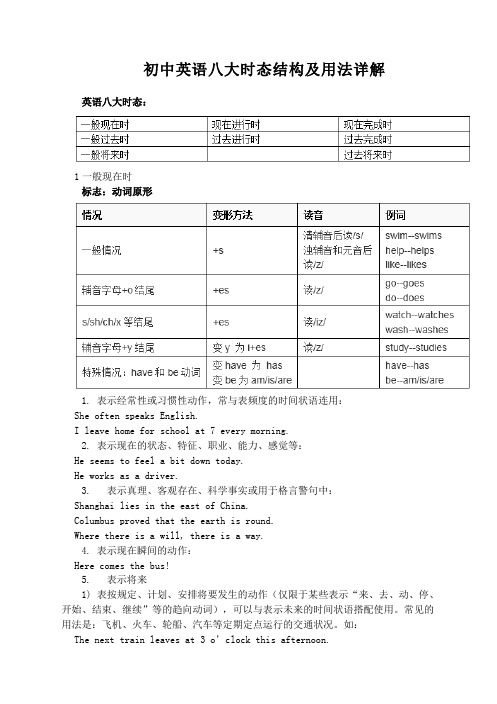
初中英语八大时态结构及用法详解英语八大时态:1一般现在时标志:动词原形1. 表示经常性或习惯性动作,常与表频度的时间状语连用:She often speaks English.I leave home for school at 7 every morning.2. 表示现在的状态、特征、职业、能力、感觉等:He seems to feel a bit down today.He works as a driver.3. 表示真理、客观存在、科学事实或用于格言警句中:Shanghai lies in the east of China.Columbus proved that the earth is round.Where there is a will, there is a way.4. 表示现在瞬间的动作:Here comes the bus!5. 表示将来1) 表按规定、计划、安排将要发生的动作(仅限于某些表示“来、去、动、停、开始、结束、继续”等的趋向动词),可以与表示未来的时间状语搭配使用。
常见的用法是:飞机、火车、轮船、汽车等定期定点运行的交通状况。
如:The next train leaves at 3 o’clock this afternoon.How often does the shuttle bus run?2) 在时间和条件状语从句中常使用一般现在时表示将来发生的事情:When Bill comes (不用will come), ask him to wait for me.I shall go there tomorrow unless I’m too busy.2一般过去时标志:动词过去式*闭音节:元音字母a, e, i, o, u如果发字母本来的音则称为开音节,否则称为闭音节。
1. 表示过去某时所发生的动作或存在的状态,常与表示过去的时间状语连用(e.g. yesterday, this morning, just now, a moment ago, in May, last night / year / week, once upon a time, the other day, before …, when …, in the past等)。
英语时态用法考点和辨析(实用经典)
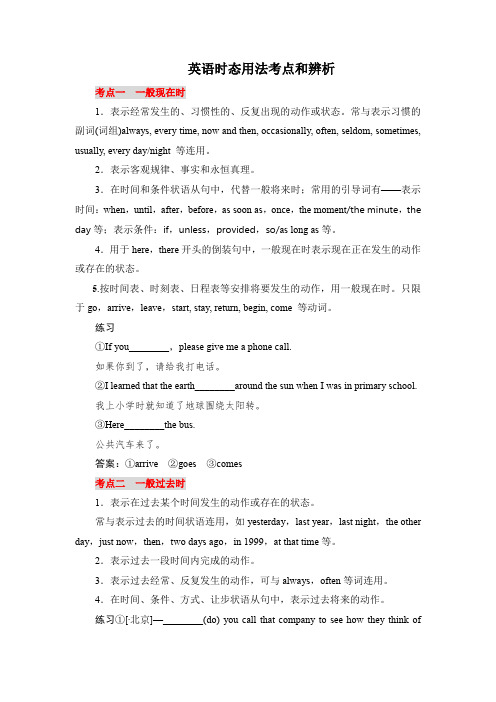
英语时态用法考点和辨析考点一一般现在时1.表示经常发生的、习惯性的、反复出现的动作或状态。
常与表示习惯的副词(词组)always, every time, now and then, occasionally, often, seldom, sometimes, usually, every day/night 等连用。
2.表示客观规律、事实和永恒真理。
3.在时间和条件状语从句中,代替一般将来时;常用的引导词有——表示时间:when,until,after,before,as soon as,once,the moment/the minute,the day等;表示条件:if,unless,provided,so/as long as等。
4.用于here,there开头的倒装句中,一般现在时表示现在正在发生的动作或存在的状态。
5.按时间表、时刻表、日程表等安排将要发生的动作,用一般现在时。
只限于go,arrive,leave,start, stay, return, begin, come 等动词。
练习①If you________,please give me a phone call.如果你到了,请给我打电话。
②I learned that the earth________around the sun when I was in primary school.我上小学时就知道了地球围绕太阳转。
③Here________the bus.公共汽车来了。
答案:①arrive②goes③comes考点二一般过去时1.表示在过去某个时间发生的动作或存在的状态。
常与表示过去的时间状语连用,如yesterday,last year,last night,the other day,just now,then,two days ago,in 1999,at that time等。
2.表示过去一段时间内完成的动作。
高考语法填空题型中的动词时态辨析技巧
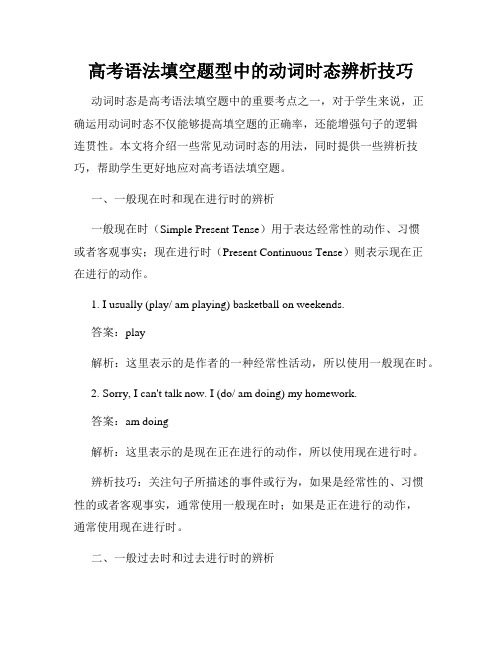
高考语法填空题型中的动词时态辨析技巧动词时态是高考语法填空题中的重要考点之一,对于学生来说,正确运用动词时态不仅能够提高填空题的正确率,还能增强句子的逻辑连贯性。
本文将介绍一些常见动词时态的用法,同时提供一些辨析技巧,帮助学生更好地应对高考语法填空题。
一、一般现在时和现在进行时的辨析一般现在时(Simple Present Tense)用于表达经常性的动作、习惯或者客观事实;现在进行时(Present Continuous Tense)则表示现在正在进行的动作。
1. I usually (play/ am playing) basketball on weekends.答案:play解析:这里表示的是作者的一种经常性活动,所以使用一般现在时。
2. Sorry, I can't talk now. I (do/ am doing) my homework.答案:am doing解析:这里表示的是现在正在进行的动作,所以使用现在进行时。
辨析技巧:关注句子所描述的事件或行为,如果是经常性的、习惯性的或者客观事实,通常使用一般现在时;如果是正在进行的动作,通常使用现在进行时。
二、一般过去时和过去进行时的辨析一般过去时(Simple Past Tense)用于表示过去某个时间发生的动作或者状态;过去进行时(Past Continuous Tense)则表示过去某个时间正在进行的动作。
1. I (visit/ was visiting) my grandparents last weekend.答案:visited解析:这里表示的是过去发生的动作,所以使用一般过去时。
2. When I came in, she (cook/ was cooking) dinner.答案:was cooking解析:这里表示的是过去某个时间正在进行的动作,所以使用过去进行时。
辨析技巧:关注句子所描述的事件或行为发生的时间,如果是过去的某个具体时间,通常使用一般过去时;如果是过去某个时间正在进行的动作,通常使用过去进行时。
英语十六种时态辨析表

5 现在进行时
am/is/are +V ing
am/is/are being +V ed
6 将来进行时
shall/will be +V shall/will be ing being +V ed
1、说话间发生 2、现阶段一直在进行 3、与短暂性动词搭配,表将来时态。 2、The children are flying kites in the park. 4、与always、forever、continually、 4、she is perpetually interfering in my affairs.(她老干预我的事) constantly、perpetually连用,表达极大的满 意或不满 1、This time next week,we shall be working in that factory. 1、表将来一段时间内会发生的动作。 2、By this time tomorrow, I'll be lying on the beach. 3、表示预定的将来动作或对将来的预测,并非 3、After you take the medicine, you will be feeling much 人为安排。 better. 服药之后,你会感觉好得多。 4、表示委婉的请求。 4、When shall we be meeting again? 我们什么时候再见面? 5、表示原因。 6、表示结果。 略 略 略 5、Please come tomorrow afternoon,I'll be having a meeting tomorrow morning. 请你明天下午来吧,明天上午我有一个会议。 7、表示对将来的打算(区别于对将来的预测)。 6、Stop the child or he will be falling over. 制止那孩子,要不他会掉下去。 7、My duties will be ending in July , and I'll be returning to ShangHai. 我的工作将在七月结束,我会回上海。 1、空
七年级英语 三种时态的用法以及辨析使用

4. This café serves (serve)afternoon tea from three to five every
day in England. 5. ----Who is playing that piano?
巩固练习
1. —What do you think of the milk? —Oh, ittastes ( taste ) good.
2. If youaren’t (not be ) careful enough in the exam, you will not
get a good grade.
4、表示过去发生的一连串动作。 过去发生的一连串动作,若用and,or,but等并列连词连接, 则一律用过去式。
巩固练习之句型转换
1. We had some delicious food this morning.(改为一般疑问句) _____________________________________?
2、现在进行时常与以下时间状语或特殊语境连用:
now at the moment at this time Look! Listen! Where is Maria? Don’t talk here. It’s nine /ten.
现在, 此时,此刻 ,
此时 看! 听!
Maria在哪? 别在这谈话。 九/十点了。
一般现在时、现在进行时与一般过去时的比较
一、意义不同: 一般现在时、现在进行时和一般过去时等,它们都是指谓语动词的时态。什 么是时态呢?在英语中,表示不同时间发生的动作或存在的状态,需用不同 的动词形式,这种不同的动词形式称为时态。也可以简单地理解为:“时” 就是谓语动词所发生的时间,“态”就是谓语动词所用的形态,例如: 1、我经常打篮球。 I often play basketball. 2、我正在打篮球。 I am playing basketball now. 3、我昨天下午打篮球了。I played basketball yesterday afternoon.
八年级下册语文知识点归纳总结

八年级下册语文知识点归纳总结一、词语辨析1.时态辨析英语中的时态分为一般现在时、一般过去时、一般将来时等,这些时态在中文中也有相应的句型与时态,但由于英语语态结构的简单性和运用广泛性,因此许多人在学习英语时常常会将时态用错,课程在这里给大家总结一下常用的时态概念和用法,希望对大家的学习有所帮助。
一般现在时:表示现在的情况或习惯性的动作。
例句:I always brush my teeth before going to bed. (我睡前总是刷牙。
)一般过去时:表示过去某个时间或一段时间内发生的动作或状态。
例句:Yesterday, I played basketball in the park with my friends. (昨天,我和我的朋友在公园里打篮球。
)一般将来时:表示将来发生的事情。
例句:I will go to Beijing next month. (我下个月要去北京。
)2.词义辨析中文词语中存在homophonic和heteronymic的情况,而英语中也有这样的情况,对于这些词语的辨析需要考虑单词的拼写,语境以及常见的用法。
例如:hear和here 二者的拼写相似,但意义和使用场合不同,hear意思是“听到”、“听说”等感官的行为,here意思是“这里”、“到这儿来”、“现在”等表示位置的介词。
例句:“I can hear the birds singing in the trees.” (我可以听到树上的鸟儿在唱歌。
)“Come over here and sit down.”(过来这边坐。
)bare和bearbare意为“赤裸裸的”,指没有遮盖的裸露之物,如“bare feet”,bear意为“熊”,动词形式bear表示“忍受”、“承担”,如“bearthe burden”。
两者同音异义,但表意完全不同。
例句:“The bear is sleeping in the forest.”(熊正在森林中睡觉。
常见八种时态标志词课件

现在进行时
现在进行时表示正在进行的动作 或存在的状态。
现在进行时的标志词包括“正在 ”、“正在”、“正在”、“正
在”等。
现在进行时可以用于描述正在发 生的事情、描述正在进行的动作
、表达正在存在的状态等。
现在完成时
现在完成时表示过去发生的动作 或状态对现在造成的影响或结果
。
现在完成时的标志词包括“已经 ”、“了”、“过”、“完成”
示例
By next year, we will have been studying English for three years.(到明年 ,我们将已经学了三年英语。)
将来完成进行时的用法
表示在将来某一时间之前已经开始的动作,并持续到将来某一时间。
表示在将来某一时间之前已经完成的动作,并对将来产生某种结果或影 响。
用法二
表示在过去的某个时间点之前,已经计划或安排好的事情,实际上 已经完成并进行了一段时间。
用法三
表示在过去的某个时间点,预计将会完成并进行一段时间的事情, 但实际上这个计划或安排被中断了。
THANKS FOR WATCHING
感谢您的观看
例句
Before I arrived, the meeting had already begun.
03
将来时态
将来时态概述
定义
表示将来某个时间将要发生的动 作或存在的状态
构成
基本结构是“助动词will/shall + 动词原形”
用法
常与表示将来的时间状语连用,如 tomorrow, next week, in 2023等
时间点
通常指过去的某个时间点,如 昨天、上周、去年等。
构成
八大时态结构详解
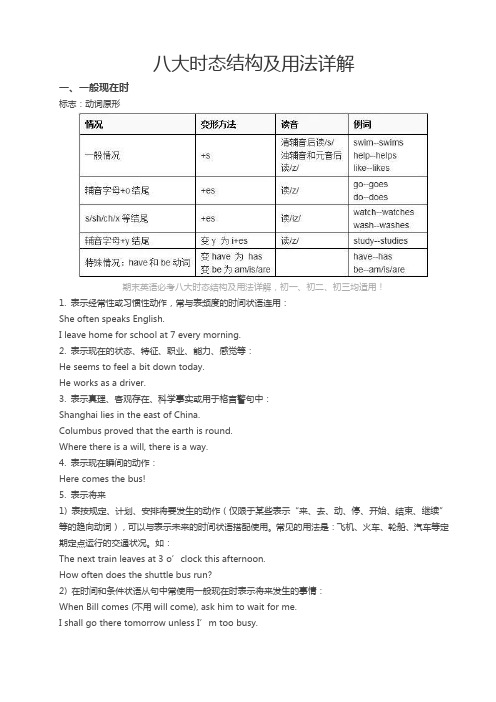
八大时态结构及用法详解一、一般现在时标志:动词原形期末英语必考八大时态结构及用法详解,初一、初二、初三均适用!1. 表示经常性或习惯性动作,常与表频度的时间状语连用:She often speaks English.I leave home for school at 7 every morning.2. 表示现在的状态、特征、职业、能力、感觉等:He seems to feel a bit down today.He works as a driver.3. 表示真理、客观存在、科学事实或用于格言警句中:Shanghai lies in the east of China.Columbus proved that the earth is round.Where there is a will, there is a way.4. 表示现在瞬间的动作:Here comes the bus!5. 表示将来1) 表按规定、计划、安排将要发生的动作(仅限于某些表示“来、去、动、停、开始、结束、继续”等的趋向动词),可以与表示未来的时间状语搭配使用。
常见的用法是:飞机、火车、轮船、汽车等定期定点运行的交通状况。
如:The next train leaves at 3 o’clock this afternoon.How often does the shuttle bus run?2) 在时间和条件状语从句中常使用一般现在时表示将来发生的事情:When Bill comes (不用will come), ask him to wait for me.I shall go there tomorrow unless I’m too busy.标志:动词过去式期末英语必考八大时态结构及用法详解,初一、初二、初三均适用!*闭音节:元音字母a, e, i, o, u如果发字母本来的音则称为开音节,否则称为闭音节。
将来时态用法辨析剖析
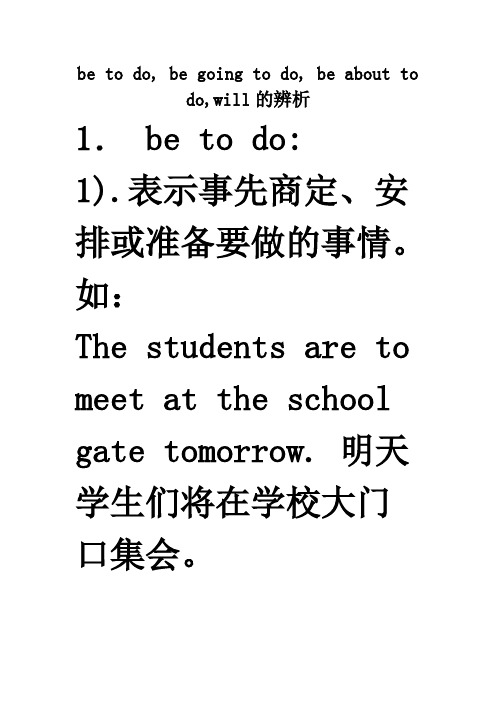
be to do, be going to do, be about todo,will的辨析1. be to do:1).表示事先商定、安排或准备要做的事情。
如:The students are to meet at the school gate tomorrow. 明天学生们将在学校大门口集会。
2).表示必要、责任、义务、禁止等。
如:Her necklace was not to (couldn't)be found. 她的项链找不到了。
(可能性)He is so tired. He is to have a holiday. (表示必要)2. be going to do:be going to与will 两者都可表示将要发生的事、将要去做某事,但它们有如下几点区别:1). be going to 表示近期、眼下就要发生的事情,will 表示的将来时间则较远一些,如:He is going to write a letter tonight. He will write a book one day.2). be going to 表示根据主观判断将来肯定发生的事情,will 表示客观上将来势必发生的事情。
He is seriously ill. He is going to die.He will be twenty years old.3). be going to 含有“计划,准备”的意思,而 will 则没有这个意思,如:She is going to lend us her book.He will be here in half an hour.4).在有条件从句的主句中,一般不用 be going to, 而多用will, 如:If any beasts comes at you, I'll stay with you and help you.5).will 有强调主观意愿和内心活动I will go and turn it off.I think she will like the cake I made for her.6).在有迹象表明的情况下进行的猜测用be going toLook at the clouds. It’s going to rain. 7).关于打算原先作好的打算用 be going to-“Kate is in hospital.”-“Yes, I know. I am going to see her this afternoon.”说话时即时的打算用will-“Kate is in hospital.”_“Oh, really, I didn’t know. I will go and see her at once.3. be about to do: 1) 表示即将发生的动作,在时间上指最近的将来。
时态辨析

She often does her homework in the evening.(重复做的动作,习惯)She is doing her homework now.(此时此刻正在做)She is writing a fiction story these days.(近期正在忙)常用短语:Always,usually ,often ,sometimes,never,every day,on Sundays,in the morning/afternoon/eveningNow,,at the moment,these days,this weekMr. Li works hard in the factory. (状态能力性格个性,客观真理)Mr. Li is always working hard in the factory.(表达感情,赞美,与频度副词连用)They are constantly making the same mistake.(表达感情,生气,与频度副词连用)I won’t go to school if it rains tomorrow.(条件从句)Take care that it doesn’t occur again.Make sure that you come back soon.Mind that you read the examination questions carefully before you begin to answer them. It doesn’t matter where we go on holiday.I hope that you like it.I bet that it rains tomorrow.The museum opens at ten tomorrow.(一般现在时表示将来,用于计划好的)The train leaves this afternoon.I am leaving tonight.(现在进行时表将来,常用于表示位置移动的词)Tom is coming to see you tomorrow.对比:The plane takes off at eight.The plane is taking off, please turn off your mobile phone.现在进行时表示事物逐渐发展的过程Nowadays business done on internet is growing rapidly.Autumn is approaching. The leaves are turning yellow.某种表示情感、意识、感官I want to go home now.He has a computer.The medicine tastes bitter.I saw a car passing by our house.This cake smells wonderful.He hears much better after an operation.某些非延续性动词也不可用于进行时admit, decide, end, allow, permit, deny, promise, accept, refuse, complete.......She often does her homework in the evening.She is doing her homework now.She is writing a fiction story these days.常用短语:Always,usually ,often ,sometimes,never,every day,on Sundays,in the morning/afternoon/eveningNow,,at the moment,these days,this weekMr. Li works hard in the factory.Mr. Li is always working hard in the factory.They are constantly making the same mistake.I won’t go to school if it rains tomorrow.Take care that it doesn’t occur again.Make sure that you come back soon.Mind that you read the examination questions carefully before you begin to answer them. It doesn’t matter where we go on holiday.I hope that you like it.I bet that it rains tomorrow.The museum opens at ten tomorrow.The train leaves this afternoon.I am leaving tonight.Tom is coming to see you tomorrow.对比:The plane takes off at eight.The plane is taking off, please turn off your mobile phone.Nowadays business done on internet is growing rapidly.Autumn is approaching. The leaves are turning yellow.某种表示情感、意识、感官I want to go home now.He has a computer.The medicine tastes bitter.I saw a car passing by our house.This cake smells wonderful.He hears much better after an operation.某些非延续性动词也不可用于进行时admit, decide, end, allow, permit, deny, promise, accept, refuse, complete.......一般过去时:I got up at six this morning/yesterday.(过去的某个时间点发生的动作)Little Tom broke the window ten minutes ago/last week.When he went into the room, he saw a stranger talking with his father.He came to our city in the year 2000.(过去一段时间的某个时间点发生的动作)Mr Jackson usually went to evening schools when he was young.(过去一段时间经常重复的动作)He was dead in 1990.(谈到已经死去的人的情况)He was a teacher.The boy opened his eyes for a moment,looked at the captain,then died.(过去连续发生的动作)过去进行时:We were watching TV from seven to nine last night.(过去某一时间正在进行的动作)I was wondering if you can give me a lift.(使语气更委婉)They were always quarreling.(与频度副词连用表感情)He was being friendly.(表示一时的表现)关键词:完成还是未完成They were building a bridge last winter.They built a bridge last winter.过去进行时可用来描绘事情发生的背景。
动词时态与语态的辨析
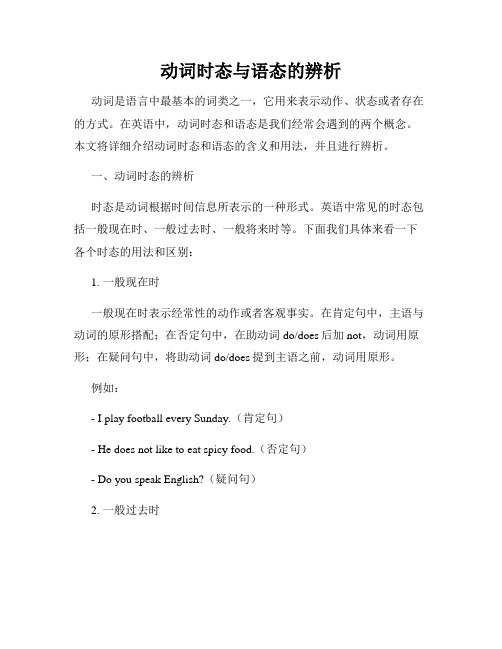
动词时态与语态的辨析动词是语言中最基本的词类之一,它用来表示动作、状态或者存在的方式。
在英语中,动词时态和语态是我们经常会遇到的两个概念。
本文将详细介绍动词时态和语态的含义和用法,并且进行辨析。
一、动词时态的辨析时态是动词根据时间信息所表示的一种形式。
英语中常见的时态包括一般现在时、一般过去时、一般将来时等。
下面我们具体来看一下各个时态的用法和区别:1. 一般现在时一般现在时表示经常性的动作或者客观事实。
在肯定句中,主语与动词的原形搭配;在否定句中,在助动词do/does后加not,动词用原形;在疑问句中,将助动词do/does提到主语之前,动词用原形。
例如:- I play football every Sunday.(肯定句)- He does not like to eat spicy food.(否定句)- Do you speak English?(疑问句)2. 一般过去时一般过去时表示过去某个时间发生的动作或者状态。
在肯定句中,主语与动词的过去式搭配;在否定句中,在助动词did后加not,动词用原形;在疑问句中,将助动词did提到主语之前,动词用原形。
例如:- She studied in London last year.(肯定句)- They did not go to the party.(否定句)- Did you watch the movie?(疑问句)3. 一般将来时一般将来时表示将来某个时间将要发生的动作或者状态。
在肯定句中,主语与助动词will搭配;在否定句中,在助动词will后加not,动词用原形;在疑问句中,将助动词will提到主语之前,动词用原形。
例如:- We will go shopping tomorrow.(肯定句)- She will not join the meeting.(否定句)- Will you come to the party?(疑问句)二、语态的辨析语态是指动词表示的是动作的主体是主动还是被动。
英语八大时态讲解
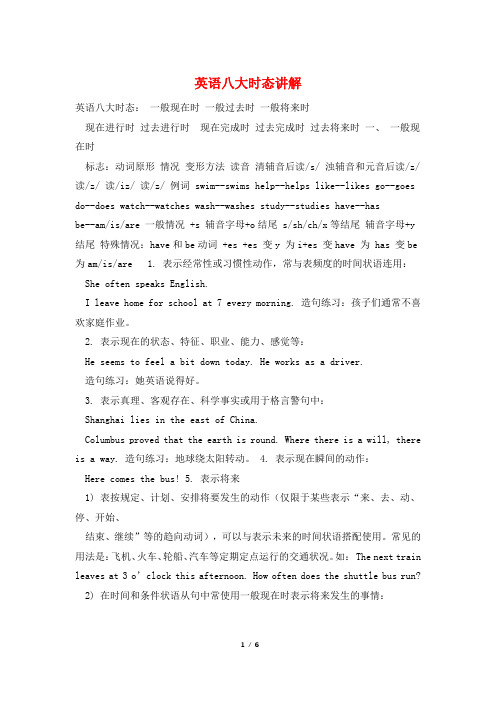
英语八大时态讲解英语八大时态:一般现在时一般过去时一般将来时现在进行时过去进行时现在完成时过去完成时过去将来时一、一般现在时标志:动词原形情况变形方法读音清辅音后读/s/ 浊辅音和元音后读/z/ 读/z/ 读/iz/ 读/z/ 例词 swim--swims help--helps like--likes go--goes do--does watch--watches wash--washes study--studies have--hasbe--am/is/are 一般情况 +s 辅音字母+o结尾 s/sh/ch/x等结尾辅音字母+y结尾特殊情况:have和be动词 +es +es 变y 为i+es 变have 为 has 变be为am/is/are 1. 表示经常性或习惯性动作,常与表频度的时间状语连用:She often speaks English.I leave home for school at 7 every morning. 造句练习:孩子们通常不喜欢家庭作业。
2. 表示现在的状态、特征、职业、能力、感觉等:He seems to feel a bit down today. He works as a driver.造句练习:她英语说得好。
3. 表示真理、客观存在、科学事实或用于格言警句中:Shanghai lies in the east of China.Columbus proved that the earth is round. Where there is a will, there is a way. 造句练习:地球绕太阳转动。
4. 表示现在瞬间的动作:Here comes the bus! 5. 表示将来1) 表按规定、计划、安排将要发生的动作(仅限于某些表示“来、去、动、停、开始、结束、继续”等的趋向动词),可以与表示未来的时间状语搭配使用。
常见的用法是:飞机、火车、轮船、汽车等定期定点运行的交通状况。
高考英语冲刺动词时态的辨析与运用

高考英语冲刺动词时态的辨析与运用高考对于每一位学子来说都是人生中的一次重要挑战,而英语作为其中的重要科目,其各个知识点的掌握都至关重要。
在英语语法中,动词时态的运用无疑是一个重点和难点。
在高考冲刺阶段,对动词时态进行深入的辨析和熟练运用,能够有效提高英语成绩。
首先,让我们来了解一下英语中常见的动词时态。
一般来说,英语动词时态包括一般现在时、一般过去时、一般将来时、现在进行时、过去进行时、将来进行时、现在完成时、过去完成时和将来完成时等。
一般现在时是我们最常见的时态之一,它用于表示经常发生的动作、客观事实、真理等。
比如,“The earth revolves s around the sun”(地球绕着太阳转。
)这里用一般现在时来陈述一个客观真理。
再比如,“Igo to school every day”(我每天去上学。
)这表示的是经常发生的动作。
一般过去时则用于表示过去发生的动作或存在的状态。
“I played basketball yesterday”(我昨天打篮球了。
)在这个句子中,“played”这个过去式清晰地表明了动作发生在过去。
一般将来时表示将来要发生的动作或存在的状态。
“I will go to Beijing next week”(我下周要去北京。
)“will +动词原形”是一般将来时常见的结构。
现在进行时用于表示正在进行的动作。
“I am reading a book now”(我现在正在读一本书。
)“be +现在分词”构成了现在进行时。
过去进行时强调过去某个时刻正在进行的动作。
“I was watching TV at eight o'clock last night”(昨晚八点我正在看电视。
)将来进行时相对用得较少,它表示将来某个时刻正在进行的动作。
现在完成时是高考中的重点时态之一,它表示过去发生的动作对现在造成的影响或结果,或者动作从过去开始一直持续到现在。
“I have learned English for ten years”(我已经学了十年英语了。
初中英语中的一般现在时与现在进行时辨析

初中英语中的一般现在时与现在进行时辨析在初中英语的学习中,一般现在时和现在进行时是两个非常重要的时态。
它们在用法、结构和意义上都有所不同,如果不能准确区分和运用,很容易在英语表达中出现错误。
接下来,让我们一起深入探讨一下这两个时态的特点和区别。
一般现在时主要用来表示经常发生的动作或存在的状态,具有习惯性、规律性和永久性的特点。
比如说,“I go to school by bike every day”(我每天骑自行车去上学。
)这里的“go”就是一般现在时,表示每天都会发生的行为。
再比如,“The sun rises in the east”(太阳从东方升起。
)这是一个客观存在的事实,也是用一般现在时来表达。
一般现在时的构成相对简单。
当主语是第三人称单数时,动词要发生相应的变化,通常是在动词词尾加“s”或“es”。
例如,“He likes music”(他喜欢音乐。
)而当主语不是第三人称单数时,动词用原形。
一般现在时在实际运用中有多种情况。
它可以用来表示日常习惯、客观真理、科学事实、格言警句等。
此外,在时间状语从句和条件状语从句中,如果主句是一般将来时,从句通常要用一般现在时来代替一般将来时。
现在进行时则主要用来表示正在进行的动作,强调动作的暂时性和当前性。
比如,“I am reading a book now”(我现在正在读一本书。
)这个句子中,“am reading”就是现在进行时,突出了“正在读”这个动作正在发生。
现在进行时的构成是“be 动词(am/is/are)+动词的现在分词”。
动词的现在分词构成规则有直接在动词后加“ing”,如“read reading”;以不发音的“e”结尾的动词,去掉“e”再加“ing”,如“write writing”;重读闭音节结尾的动词,双写末尾的辅音字母再加“ing”,如“run running”等。
现在进行时也有一些常见的时间状语,比如“now”(现在)、“at the moment”(此刻)、“Look!”(看!)、“Listen!”(听!)等。
中考年英语句子时态辨析

中考年英语句子时态辨析年中考英语句子时态辨析一.英语句子各种时态的含义:I have bought this watch for five years. I have had this watch for five years.The old man has died for ten years. → The old man has been dead for ten years.I have left hometown for 10 years. → I have been away from hometown for 10 years. He has come back for 3 days. → He has been back for 3 days/since 3 days ago.The film has begun for 5 minutes. → The film has been on for 5 minutes.His father has joined the Party since 1950. → His father has been in the Party since 1950.四.英语句子各种时态中动词的变化形式:一、AAA型(原形→原形→原形)三、ABC型 1. ow →ew →own3. 原形→过去式→过去式+(e)n4. 原形→□lt→□lt五、AAB型第一种:状态系动词----表示主语状态,只有be一词;第二种:持续系动词---表示主语继续或保持一种状况或态度:keep, rest, stay, lie, stand;第三种:表像系动词--用来表示"看起来像"这一概念,主要有seem, appear, look;第四种:感官系动词---感官系动词主要有feel, smell, sound, taste;第五种:变化系动词----表示主语变成什么样,主要有become, grow, turn, fall, get, go, come;第一类带“to”结构:动词+sb. sth.= 动词+ sth. to sb.第二类带“for”结构:动词+sb, sth.= 动词+ sth. for sb.二、英语书面表达专项训练2.你是一位九年级的学生李明,你用英语写一封邮件给你的笔友Amy,感谢她对你关心,并告诉她目前你在全力以赴为中考而学习,并与她交流一下目前的学习和生活情况。
英语几种时态归纳
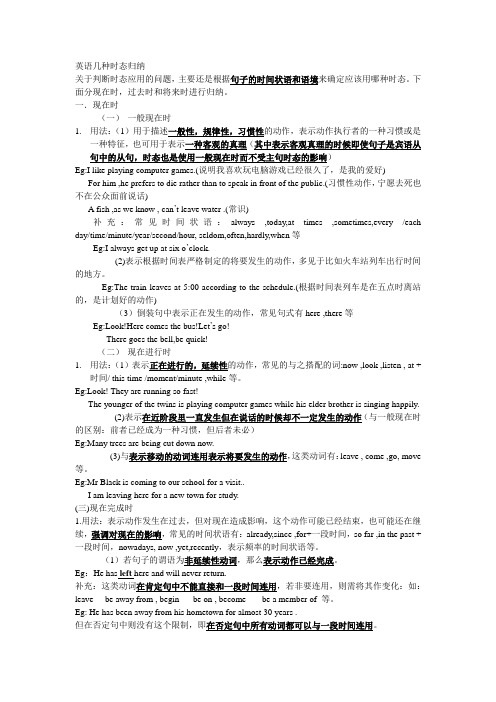
英语几种时态归纳关于判断时态应用的问题,主要还是根据句子的时间状语和语境来确定应该用哪种时态。
下面分现在时,过去时和将来时进行归纳。
一.现在时(一)一般现在时1.用法:(1)用于描述一般性,规律性,习惯性的动作,表示动作执行者的一种习惯或是一种特征,也可用于表示一种客观的真理(其中表示客观真理的时候即使句子是宾语从句中的从句,时态也是使用一般现在时而不受主句时态的影响)Eg:I like playing computer games.(说明我喜欢玩电脑游戏已经很久了,是我的爱好) For him ,he prefers to die rather than to speak in front of the public.(习惯性动作,宁愿去死也不在公众面前说话)A fish ,as we know , can’t leave water .(常识)补充:常见时间状语:always ,today,at times ,sometimes,every /each day/time/minute/year/second/hour, seldom,often,hardly,when等Eg:I always get up at six o’clock.(2)表示根据时间表严格制定的将要发生的动作,多见于比如火车站列车出行时间的地方。
Eg:The train leaves at 5:00 according to the schedule.(根据时间表列车是在五点时离站的,是计划好的动作)(3)倒装句中表示正在发生的动作,常见句式有here ,there等Eg:Look!Here comes the bus!Let’s go!There goes the bell,be quick!(二)现在进行时1.用法:(1)表示正在进行的,延续性的动作,常见的与之搭配的词:now ,look ,listen , at +时间/ this time /moment/minute ,while等。
法语常用时态辨析

法语的主要时态(图表及解释)过去时:⑴最近过去时(助动词venir的变位+ de faire): 表示刚刚完成的动作,相当于英语的have just done。
如Je viens de finir mon devoir./ Il vient de se lever./ Nous venons de voir ce film.⑵复合过去时:过去已经完成的动作,但其结果与现在有关联或影响,相当于英语的现在完成时或一般过去时。
♣助动词avoir的变位+过去分词,表示动作的完成。
如J’ai déjà fait ce travail hier soir./ Vous avez compris le discours du professeur Li?/ As-tu acheté ce livre?/ Tu l’as vue hier? ♣助动词être的变位+过去分词,表示位置、状况的变化,过去分词有性数的变化,其结果与现在有关联或影响。
如Elle est allée au cinéma hier soir./ A quelle station vous êtes descendu s?/ Ils sont devenu s ingénieurs.♣所有代动词以être作助动词,即s’être的变位+过去分词,表示已经完成的动作。
se 是直接宾语时,过去分词有性数的变化;se是间接宾语时,过去分词不变化;用于被动意义和绝对意义时,过去分词均有性数的变化。
如Je me suis levée tard le dimanche./ Vous vous êtes bien amusés hier?/ Catherine, où tu t’es baignée hier soir?/ Les cassettes se sont vendu es vite./ Elle s’est occupée de ce travail.⑶愈过去时(助动词avoir和être的未完成过去时变位+过去分词):过去的过去时,表示在另一个已完成的动作(通常用复合过去时、简单过去时、未完成过去时)之前完成的动作,强调动作发生的先后顺序,两个动作前后时间上相距有一定间隙。
- 1、下载文档前请自行甄别文档内容的完整性,平台不提供额外的编辑、内容补充、找答案等附加服务。
- 2、"仅部分预览"的文档,不可在线预览部分如存在完整性等问题,可反馈申请退款(可完整预览的文档不适用该条件!)。
- 3、如文档侵犯您的权益,请联系客服反馈,我们会尽快为您处理(人工客服工作时间:9:00-18:30)。
Grammar⏹simple past, past progressive, past perfect⏹verbs of perception⏹special word order with as and though⏹present participle phrases used as adverbialssimple past, past progressive, past perfect⏹simple past tense: verb + -ed or irregular verbs1) completed action in the past:–I planted these roses a long, long time ago… (L22)–A year and a half later, my grandfather became gravely ill. (L38)2) habits or facts in the past:–It was my way of saying thank you to God. (L24)–I used to watch him pick roses for his mother. (L25)3) duration in the past:–For a moment he just stared off into the apple trees. (L10)4) past tense of verbs such as want, wonder, hope is used for polite inquiries.–I wondered how you liked the film.⏹past progressive tense: was/were + v.-ing (present participle)1) interruption in the past: Use the Past Progressive to indicate a longer action in the past that was interrupted.–I was standing by his rosebush when an uncle came to tell me… (L49)2) In 1), described above, the Past Progressive is interrupted by a shorter action in the Simple Past. However, you can also use a specific time as an interruption.–Last night at 6 PM, I was eating dinner.*In the Simple Past, a specific time is used to show when an action began or finished. In the Past Progressive, a specific time only interrupts the action.–Last night at 6 PM, I ate dinner.—I started eating at 6 PM.–Last night at 6 PM, I was eating dinner.—I started earlier; and at 6 PM, I was in the process of eating dinner.3) parallel actions: two or more actions happening at the same time–I was studying while he was making dinner.–They were eating dinner, discussing their plans, and having a good time.4) atmosphere: a series of parallel actions to describe the atmosphere at a particular time in the past–When I walked into the office, several people were busily typing, some were talking on the phones, the boss was yelling directions, and customers were waiting to be helped. One customer was yelling at a secretary and waving his hands. Others were complaining to each other about the bad service.5) repetition and irritation with “always”: expressing the idea that something irritating or shocking often happened in the past–I didn’t like them because they were always complaining.6) “when” vs. “while”: “when” is most often followed by the Simple Past, whereas “while” is usually followed by the Past Progressive.–I was studying when she called.–While I was studying, she called.⏹past perfect tense: had + v.pp. (past participle)1) completed action before sth. in the past:–My whole life, brief as it was, had been spent in that big old house, … (L2)–I saw my grandfather’s tears. I had never seen him cry before. (L26)–…an uncle came to tell me that my grandfather had di ed. (L49-50)–I reached deep within me for those special feelings that had made up our friendship. (L50-51)–I knew what he had meat about never saying goodbye… (L51-52)2) duration before sth. in the past:–We had had that car for ten years before it broke down.–They felt bad about selling the house because they had owned it for more than forty years.3) a lack of experience rather than an action at a specific time: the Past Perfect should be used rather than the simple past.–She had never seen a bear before she moved to Alaska.√–She never saw a bear before she moved to Alaska. ×⏹Practice: Grammar exercises I., II., III.verbs of perception⏹verb of perception + object + infinitive without to (as the object complement)1) Suddenly I felt a hand rest on my shoulder.(L5-6)2) I used to watch him pick roses for his mother. (L25)3) I had never seen him cry before. (L26)cf.4) I looked up to see my grandfather. (L6)5) I see something soft and beautiful, Grandpa. (L18-19)6) I saw my grandfather’s tears. (L26)⏹Verbs of perception are a set of verbs denoting the use of one of the physical senses. Some verbs of perception see, look at, hear, listen, and feel, along with watch and sense can be used with objects followed by verbs in -ing form, -ed form and infinitive (without to) form.–I heard him shout at her just now. (emphasis on my hearing)–I heard him shouting at her when I passed his office. (emphasis on his shouting)–John has never heard the piece played before. (emphasis on the passive voice of play)*infinitive with to in passive:–She was seen to dance in the garden.–(We saw her dance in the garden.)*Practice: Grammar exercises IV.special word order with as and though⏹In an adverbial clause of concession (concessive clause) introduced by though or although, the complement or the adverbial can be placed at the beginning of the sentence. The formula for the inversion is:complement/adverbial + as/though + subject + predicate verbor: adj./adv. + as/though + n. + predicate verbv. + as/though + n. + auxiliary verb–My whole life, brief as/though it was, had been spent in that big old house. (L2-3)–Unlikely as/though it might seem, I’m tired too.–Try as/though she might / Hard as/though she tried, Sue couldn’t get the door open.*Practice: Grammar exercises V.Present participle phrases used as adverbials⏹Present participle phrases can be used as adverbials to express reason, condition, time, result and attending circumstances.–Turning around, she saw an ambulance driving up. (time)–Knowing English well, he can read Shakespeare. (reason)–Working still harder, you will succeed. (condition)–Their car was caught in a traffic jam, thus causing the delay. (result)–He sat at the window eating. (attending circumstances)⏹ing-clause indicating attending circumstances–…I ran to the haven of the small back porch and sat alone, shuddering, as tears welled up from my heart.(L4-5)–I looked at the flower, not knowing what to say,…(L18)–Remembering Grandpa’s words, I reached deep within me for those spe cial feelings that had made up our friendship.(L50-51)*Practice: Grammar exercises VI.1) _________________, the teacher came into the hall.2) ___________ the teacher, the children came into the hall.3) ____________ the young people, the elderly woman felt very happy.4) She stood there for more than an hour, ________ them at play.5) _________________ the other day, I saw a bird building a nest.6) He put the big box down on the floor, ________ heavily and _______ exhausted.Note-writing。
